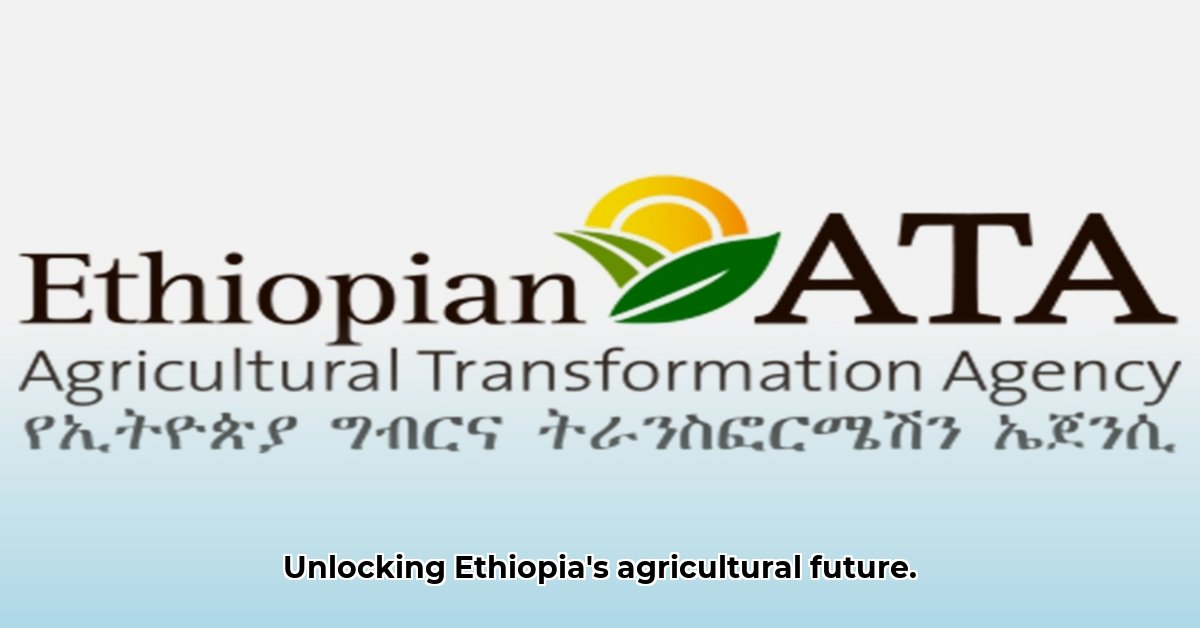Imagine Ethiopia, a land where farming is life for millions. But farming there faces huge challenges – from drought to lack of good tools and training. Can innovation and dedication solve these problems and ensure food security? This article explores the Ethiopian Agricultural Transformation Institute (ATI), an organization committed to revolutionizing Ethiopian agriculture. We will examine their successes, challenges, and comparative performance against similar programs. The focus will be on how they empower small farmers, the obstacles they encounter, and their strategic vision for a brighter future for Ethiopian agriculture and the nation as a whole.
Agricultural Transformation Institute: Catalyzing Sustainable Growth in Ethiopia
Ethiopia’s economy is fundamentally agricultural, with a significant portion of the population engaged in farming. Enhancing agricultural productivity is, therefore, crucial for national prosperity. The Ethiopian Agricultural Transformation Institute (ATI), previously known as the Agricultural Transformation Agency (ATA), plays a pivotal role in this context. Its primary objective is to modernize Ethiopia’s agricultural sector and foster the prosperity of smallholder farmers, thereby stimulating overall economic growth. How effective is the ATI in achieving sustainable growth? Let’s examine their impact.
A Holistic Approach to Agricultural Efficiency
The ATI adopts a comprehensive approach aimed at enhancing agricultural efficiency by establishing a robust support system for farmers. This includes promoting improved farming policies, facilitating technological advancements, and investing in farmer education. A notable example is the Agricultural Commercialization Clusters (ACCs). These strategically selected areas provide farmers with convenient access to markets, training programs, and essential resources, acting as agricultural “incubators” that foster growth and opportunity. Furthermore, the ATI operates a farmer hotline (8028), offering immediate advice and information, which disseminates vital knowledge and enhances farming methodologies.
Successes and Areas for Improvement in Farming Practices
There is substantial evidence indicating the ATI’s positive impact. The ACC program has demonstrably expanded market access for numerous farmers, and the 8028 hotline has proven invaluable to thousands. However, quantifying the overall impact precisely requires more rigorous data. While anecdotal evidence is abundant, comprehensive data collection and analysis are necessary for an accurate assessment.
One area needing improvement is inter-organizational collaboration. Clarifying the relationship between the ATI and key institutions such as the Ethiopian Institute of Agricultural Research (EIAR) is crucial. Effective teamwork and the avoidance of duplicated efforts are essential for optimizing resource utilization. The ATI’s ultimate success depends on fostering strong partnerships and enhancing inter-organizational communication.
Overcoming Challenges in Diverse Landscapes
Transforming agriculture in Ethiopia presents significant challenges due to the country’s diverse farming zones, each requiring tailored approaches. Effective engagement with local systems is also essential. The ATI’s success hinges on its ability to navigate the complex political and administrative landscape and to disseminate effective farming techniques across diverse regions.
Future Prospects: Addressing Potential Obstacles
The ATI’s long-term success faces potential challenges, notably its reliance on funding and vulnerability to political instability. The following table outlines these risks and proposes mitigation strategies:
| Risk Factor | Likelihood | Impact | Mitigation Strategy |
|---|---|---|---|
| Funding Dependence | High | High | Diversify funding sources; demonstrate return on investment; strengthen partnerships |
| Institutional Capacity Deficits | Medium | Medium | Invest in training programs; improve inter-institutional linkages; develop internal expertise |
| Political Instability | Medium | High | Develop adaptable programs; cultivate local relationships; promote community ownership |
| Climate Change Impact | High | High | Prioritize climate-resilient practices; promote drought-resistant crops |
| Market Volatility | Medium | Medium | Enhance market connections; encourage crop diversification; support value chain development |
Addressing these risks requires strategic planning, diversification of funding sources, community engagement, and investment in climate-resilient agricultural practices.
Envisioning the Future of the Agricultural Transformation Institute in Ethiopia
The ATI has undertaken a significant challenge. Despite the obstacles, its comprehensive strategy offers hope for Ethiopia’s agricultural advancement. Sustained success necessitates continued investment in data collection, enhanced collaboration with government bodies, and a focus on building local expertise. Through diligent effort and adaptive strategies, the ATI can realize its vision of a prosperous and sustainable agricultural sector.
How ATI’s Agricultural Initiatives Impact Ethiopian Farmer Income
Key Takeaways:
- Ethiopia aims to uplift smallholder farmer incomes through commercialization, intensification, and improved market access.
- The Agricultural Commercialization Cluster (ACC) initiative is crucial, but its sustainability requires evaluation.
- Success relies on coordination, private sector engagement, and addressing infrastructural and climate-related challenges.
- Data limitations hinder assessments of the ACC’s impact on farmer incomes, necessitating further research.
- Gender inequalities persist, requiring targeted interventions.
Understanding Ethiopia’s Agricultural Transformation
Ethiopia’s agricultural sector is undergoing a transformation to improve farmer prosperity. The Agricultural Transformation Institute (ATI) is a key player in achieving this. Understanding how ATI’s agricultural initiatives impact Ethiopian farmer income is a complex question.
The strategy focuses on commercialization, intensification, and better market connections. The Agricultural Commercialization Cluster (ACC) exemplifies this approach by boosting incomes through focused efforts in specific regions.
The Agricultural Commercialization Cluster (ACC) Initiative
The ACC shows promise in assisting farmers by concentrating efforts on specific crops in specific areas to simplify logistics and improve efficiency. This creates economies of scale, improving market access and farmer income.
However, challenges remain, including a scarcity of reliable data on the ACC’s effectiveness. While some studies indicate increased yields and sales, a complete picture is missing. What happens when funding dries up?
Addressing Systemic Constraints
The success of how ATI’s agricultural initiatives impact Ethiopian farmer income isn’t solely dependent on the ACC. Other crucial factors include:
- Infrastructure: Poor infrastructure hinders farmers’ ability to efficiently reach markets.
- Capacity Building: Farmers need access to training, technology, and credit.
- Climate Resilience: Ethiopia is vulnerable to climate change, requiring strategies to mitigate its effects.
- Gender Equity: Addressing disparities faced by women farmers is vital for inclusive growth.
The Path Forward: Data, Collaboration, and Sustainability
To understand the impact of ATI’s initiatives fully, robust data collection and analysis are necessary to capture regional variations and the experiences of different farmer groups. Collaboration between government agencies, the private sector, and international partners is essential for sustained success. This ensures a holistic approach, addressing the multiple challenges faced by Ethiopian farmers. Finally, attention must be given to long-term sustainability in terms of funding and institutional capacity.
ATI’s Strategies for Climate Change Resilience in Ethiopian Agriculture
Ethiopia’s agricultural sector faces climate change impacts, including erratic rainfall, drought, and floods. The Ethiopian Agricultural Transformation Institute (ATI) spearheads ambitious initiatives to build resilience in Ethiopian agriculture. What are ATI’s Strategies for Climate Change Resilience in Ethiopian Agriculture?
ATI’s Multi-Pronged Approach
The ATI employs strategic approaches, including:
- Promoting Climate-Smart Agriculture (CSA): CSA practices enhance productivity and resilience by optimizing fertilizer use, promoting crop diversification, and improving water management.
- Enhancing Water Management: Efficient irrigation and water harvesting techniques are crucial for mitigating drought impacts.
- Diversifying Crop Production: Promoting drought-resistant crops safeguards farmer incomes.
- Strengthening Early Warning Systems: Disseminating timely climate information enables farmers to make informed decisions.
- Building Farmer Capacity: Training programs empower farmers to adopt climate-resilient agricultural practices.
- How To Create Free Electricity Using Home Renewable Sources - January 30, 2026
- How to Produce Electricity at Home for Energy Independence - January 29, 2026
- How To Create Electricity At Home For Energy Independence - January 28, 2026
















